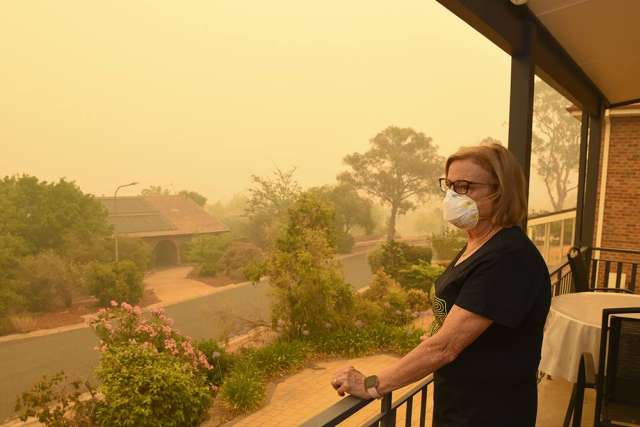Wildfires have already covered about five million acres of American land this year, with almost a third of those acres located in California. With that much wildfire concentrated in one area of the country, residents of the region are bound to feel the effects of the smoke.
The problem is that many people don’t even realize the danger they are facing, according to Reza Ronaghi, MD, a UCLA Health pulmonologist who also practices interventional pulmonology. “Wildfire smoke contains dangerous levels of micromillimeter-sized particles that can’t always be smelled or seen,” he says. “Just watching for smoke or smelling the air is not a good indication of whether or not these particles are present and affecting you.”
To protect your lung health both now and long-term, Dr. Ronaghi helps us answer common questions about wildfire smoke and its effects on your lungs:
What makes wildfire smoke more dangerous to your health than campfire smoke?
While any type of smoke can be harmful to your lungs, wildfire smoke poses more significant risk for two reasons:
- Prolonged exposure: Most people sit around a campfire or firepit for only a few hours. Wildfire smoke can contaminate the air for days, weeks or even months.
- Number of particles inhaled: Campfires produce particles, but compared to the surrounding atmosphere, the particles inhaled are minimal. Wildfires often include thousands of acres or more, making the pollution from the fire very heavy and dense.
What are the acute symptoms of wildfire smoke exposure?
The immediate symptoms of exposure to wildfire smoke tend to be consistent for most people and include:
- Burning in the back of the throat
- Burning sensation in the eyes
- Cough
- Runny nose
- Shortness of breath
The severity of your symptoms depends on whether or not you have a lung condition such as asthma, COPD or cystic fibrosis. “For people with lung disease, we worry about the disease immediately worsening, causing shortness of breath or coughing that could lead to hospitalization,” Dr. Ronaghi says. “If you don’t currently have any lung conditions, exposure may cause discomfort that should clear up once you remove yourself from the smoke.”
When should you seek medical help for symptoms from wildfire smoke exposure?
Mild symptoms should subside within 24 to 48 hours after smoke exposure ends. If your symptoms do not improve, check in with your primary care provider.
If you have severe symptoms, especially if you have an existing lung condition, Dr. Ronaghi suggests seeking medical care immediately in an acute or emergency setting.
Who is at risk for long-term effects of wildfire smoke on your lungs?
According to Dr. Ronaghi, everyone with continual exposure to wildfire smoke is at risk for eventual respiratory issues, even if you don’t have any lung conditions now.
“In general, if you’re exposed once or twice in your life, you won’t have any long-term detrimental lung issues,” he says. “The problem is when you’ve repeatedly been exposed over the course of 5, 10 or 15 years. You may eventually develop symptoms associated with lung issues (such as persistent cough or shortness of breath) or your existing lung disease will likely worsen.”
How can you protect yourself from wildfire smoke?
Since you can’t always see or smell the smoke that’s affecting you, get in the habit of checking the air quality daily. The air quality meter is available through your local news or weather channel. If you have to be outside when air quality is not good, wear an appropriate mask. Only certain masks, such as N95 or N100 masks, will successfully filter out particles of that size.
If you don’t have a mask, remove yourself from exposure immediately. “Get inside, close all the windows and run an air purifier,” Dr. Ronaghi says. “If wildfire smoke is dense in your area, consider leaving the community for a week or two or until the wildfire subsides.”
Taking a few precautions before wildfires arise will help minimize your exposure to smoke when the time comes. Dr. Ronaghi suggests:
- Fix cracks in your windows and doors: When you close windows and doors, air shouldn’t be able to get into the house.
- Invest in an air purifier: Using a purifier with a HEPA (high-efficiency particulate air) filter will remove even the smallest particles and dust that get inside your home.
- Secure appropriate masks: Have N95 or N100 masks on hand before wildfire season, in case you need to go outside when the air quality is poor.
If you have prolonged exposure to wildfire smoke or ongoing respiratory symptoms, speak to your primary care provider.




